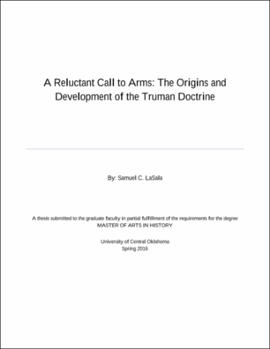| dc.contributor.advisor | Li, Xiaobing, 1954- | |
| dc.contributor.author | LaSala, Samuel C. | |
| dc.date.accessioned | 2020-07-09T14:38:49Z | |
| dc.date.available | 2020-07-09T14:38:49Z | |
| dc.date.issued | 2016 | |
| dc.identifier.other | (AlmaMMSId)9982453282702196 | |
| dc.identifier.uri | https://hdl.handle.net/11244/324992 | |
| dc.description.abstract | For nearly seventy years, historians have scrutinized the origins of the Cold War and debated the Truman Doctrine's significance to this international conflict. These sometimes emotional deliberations produced three distinct narratives, which sought to justify, assail, or simply explain the thirty-third president's impact on US-Soviet relations between 1945 and 1947. Not surprisingly, all of these interpretations accept the premise that the chief executive's appeal for the Greek-Turkish aid package constituted a fundamental change in Washington's foreign policy towards Moscow. This thesis, however, posits that Truman never intended to establish an open-ended universal policy designed to govern America's international agenda for the Cold War's entire duration. On the contrary, an analysis of government documents, personal memoirs, oral histories, and contemporary periodicals reveal the commander-in-chief as an inexperienced world leader whose ambivalence towards the USSR created an initial reluctance on his part to publicly criticize the Kremlin's leadership. Evidence suggests that negative domestic factors in late 1946 prompted the chief executive to openly embrace a confrontational policy towards the Soviet Union. Determined to revitalize his beleaguered administration, Truman readily co-opted the Republican's anti-communist position when he decided to safeguard Athens' government from Greece's ongoing insurgency. Consequently, he countered Moscow's perceived aggression in the Balkans with an extreme rhetorical stance calculated to gain immediate support from a hostile Congress and indifferent American public. Truman's zealous pursuit of this short term goal, however, inadvertently altered the public's long-term conception of US-Soviet relations. Though he never meant to establish a new doctrine, the president's speech ultimately resulted in a major paradigm shift in world affairs. | |
| dc.rights | All rights reserved by the author, who has granted UCO Chambers Library the non-exclusive right to share this material in its online repositories. Contact UCO Chambers Library's Digital Initiatives Working Group at diwg@uco.edu for the permission policy on the use, reproduction or distribution of this material. | |
| dc.subject.lcsh | World politics | |
| dc.subject.lcsh | Cold War | |
| dc.title | A reluctant call to arms : the origins and the development of the Truman Doctrine. | |
| dc.type | Academic theses | |
| dc.contributor.committeeMember | Loughlin, Patricia | |
| dc.contributor.committeeMember | Plaks, Jeff | |
| dc.thesis.degree | M.A., History | |
| dc.subject.keywords | Cold War | |
| dc.subject.keywords | Truman Doctrine | |
| dc.identifier.oclc | (OCoLC)ocn952489307 | |
| uco.group | UCO - Graduate Works and Theses::UCO - Theses | |
| thesis.degree.grantor | Jackson College of Graduate Studies. | |
